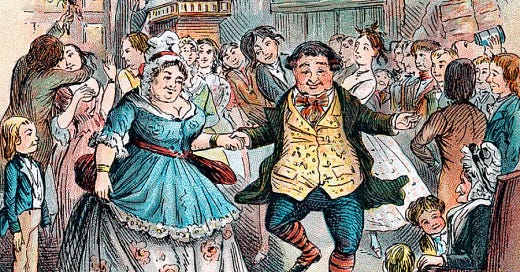To enter the warm, effervescent whirl of Fezziwig’s Ball, as rendered by Charles Dickens in A Christmas Carol, is to momentarily depart from the grim moral calculus of Victorian commerce, where workhouses and debtor’s prisons loom large as industrial era specters. Instead, Dickens gives us a scene so saturated with goodwill and lighthearted extravagance that it feels almost alchemical: a moment where human connection triumphs over the cold, metallic clink of coin. The smallness of the gesture—a mere office party, really—swells to encompass something transcendent, a generosity that defies monetary valuation and radiates an infectious joy.
Fezziwig himself, a man of “a capacious waistcoat” and “laughing all over himself,” presides over this humble Bacchanalia with the enthusiasm of a conductor bringing forth harmony from chaos. This is no perfunctory employer’s gesture meant to keep the wheels of labor greased; this is a genuine outpouring of gratitude, an embodied rebuke to the grim economies of Scrooge’s later years. Fezziwig spends but “a few pounds of your mortal money,” but the effect on his employees is seismic. Beneath the glow of candlelight and the pluck of fiddle strings, the drudgery of accounting books and warehouse inventories evaporates, replaced by something miraculous: the dignity of being human, and the exaltation of being seen.
And what music it is! The live musicians, led by a "dexterous" fiddler whose bow seems to conduct not just melody but pure mirth, summon a centrifugal force that pulls everyone into the dance. Even Dickens, not often prone to physical description, lingers over the mechanics of movement: the stamping, swirling, and the unabashed exuberance of legs that, moments before, had trudged through another workday. Young Ebenezer Scrooge, awkward though he may be, joins in with the kind of abandon that comes not from forgetting oneself but from remembering, for once, what it means to belong.
The room itself, though modest, becomes a vessel for enchantment. The “warehouse” is transformed into a space of possibility, a reminder that even the drabbest corners of industrial capitalism can serve as the cradle for something sacred when lit by the flame of communal joy. It is Dickens’s sly genius to make this space come alive—not through wealth, but through what wealth, at its best, enables: human connection, laughter, and gratitude. Fezziwig’s Ball resists becoming merely another capitalist exchange. Instead, it blooms into a reminder of what economies too often forget: that there are currencies beyond gold, and that kindness, distributed wisely, yields the highest return.
Fezziwig, in this moment, becomes a kind of Christ-like figure, though Dickens keeps him firmly rooted in his jolly, mortal form. He embodies charity not as obligation, but as reflex, as natural and essential as breathing. When the young Scrooge reflects on this evening, his future hardened self finds its armor briefly pierced. The joy, the laughter, the sheer improbability of unbridled human generosity—these are lessons etched into the sinews of memory, though they will take decades and the intervention of three ghosts to fully germinate.
What makes this scene immortal is its paradoxical nature: grand in its emotional resonance, yet small in its material reality. Dickens reminds us that joy is not something bought, but created, summoned like the fiddler’s tune from strings and effort and love. Fezziwig’s Ball is, in the end, a benediction: an offering to a weary world that what is truly good requires only the will to share it.
Michael S. Rose is author of the New York Times bestseller Goodbye, Goodmen (Regnery), Ugly As Sin (Sophia Institute), The Art of Being Human (Angelico), Benedict XVI: The Man Who Was Ratzinger (Spence), and other books.





